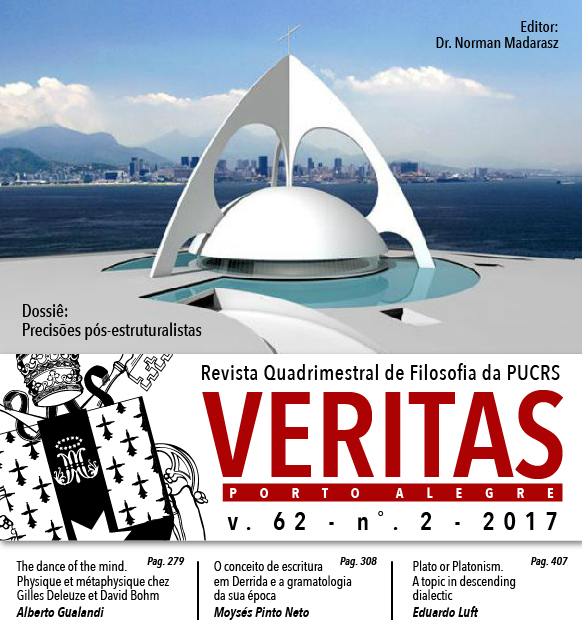The concept of writing in Derrida and grammatology of his epoch
DOI:
https://doi.org/10.15448/1984-6746.2017.2.27656Keywords:
writing, grammatology, Derrida, science, interdisciplinarity.Abstract
The aim of this paper is to explore the relation between Jacques Derrida’s Of Grammatology and the science of its time. We begin with a discussion of three important authors cited by Derrida as sources of his research on writing (écriture): Madeleine V-David, André Leroi-Gourhan and those published in the compilation Colloque. Their work is used to explain the role of writing itself in Derrida’s thinking
as a sign of his materialism. In contrast to ordinary uses of the term “writing”, our task is to understand the latter metonymically as an inscription carved into the real. In virtue of the interdisciplinary debate on Derrida’s work, we thus seek to understand the multiple dimensions through which this problem has been thought.
Downloads
References
BARING, Edward. The Young Derrida and French Philosophy, 1945-1968. New York: Cambridge University Press, 2011. DOI: https://doi.org/10.1017/CBO9780511842085
Centre International de Synthèse. L'écriture et la psychologie des peuples. XXII Semaine de Synthèse. Paris: Armand Colin, 1963.
DAVID, Madeleine V. Le débat sur les écritures at l'hiéroglyphe aux XVIIe et XVIIIe siècles – et la application de la notion de déchiffrement aux écritures mortes. Paris: S.E.V.E.N, 1965.
DELEUZE, Gilles; GUATTARI, Félix. Mil Platôs, v. 1. Trad. Aurélio Guerra e Costa Pinto. Rio de Janeiro: Editora 34, 1995.
DERRIDA, Jacques. “Introduction”. In: Husserl, E. L'Origine de la géométrie. Paris: PUF, 1962.
______. A Escritura e a Diferença. Trad. Maria B. M. Nizza da Silva et al. 4. ed. São Paulo: Perspectiva, 2010.
______. Gramatologia. Trad. Miriam Chnaiderman e Renato Janine Ribeiro. São Paulo: Perspectiva, 2004.
______. De la Grammatologie. Paris: éditions de Minuit, 1967.
______. A Farmácia de Platão. Trad. Rogério Costa. São Paulo: Iluminuras, 2005.
______. Posições. Trad. Tomaz Tadeu da Silva. Belo Horizonte: Autêntica, 2001.
DERRIDA, Jacques; STIEGLER, Bernard. Echographies of Television. Trad. Jennifer Bajorek. Polity, 2002.
DUQUE-ESTRADA, Paulo César. “Derrida e a escritura”. In: Às margens: a propósito de Derrida. Rio de Janeiro: PUC-Rio/Loyola, 2002.
HÄGGLUND, Martin. Radical Atheism: Derrida and the time of life. Stanford: Stanford University Press, 2008. DOI: https://doi.org/10.1515/9780804779753
JOHNSON, Christopher. System and Writing in the philosophy of Jacques Derrida. Cambridge: Cambridge University Press, 1993. DOI: https://doi.org/10.1017/CBO9780511553950
______. “The cybernetic imaginary”. In: Reading Derrida's Of Grammatology. Ed. Sean Gaston e Ian Maclachlan. London: Continuum, 2011.
______. Derrida: a cena da escritura. São Paulo: Editora UNESP, 2001.
KIRBY, Vicki. “Tracing life: 'la vie la mort’”. The new continental review, 9, 1 (2009), p. 107-126. DOI: https://doi.org/10.1353/ncr.0.0059
______. “Original science: nature deconstructing itself”. Derrida Today, 3, 2 (2010). DOI: https://doi.org/10.3366/drt.2010.0204
LEROI-GOURHAN, Andre. O gesto e a palavra, v. I – Técnica e linguagem. Porto: Edições 70, 1983.
_____. O gesto e a palavra, v. II – Memória e ritmos. Porto: Edições 70, 1983.
LOBO, Rafael Haddock. Derrida e o labirinto de inscrições. Porto Alegre: Zouk, 2008.
MALABOU, Catherine. La plasticité au soir de l'écriture: dialetique, destruction, déconstruction. Paris: Éditions Léo Scheer, 2005.
PEETERS, Benoît. Derrida. Trad. André Telles. Rio de Janeiro: Civilização Brasileira, 2013.
PINTO NETO, Moysés. A escritura da natureza: Derrida e o materialismo experimental. Tese de Doutorado defendida no PPG Filosofia da PUCRS. Porto Alegre, 2013.
____ . “Bernard Stiegler: pensador da tecnologia e do humano”. Dois Pontos, UFPR, 12 (2015). DOI: https://doi.org/10.5380/dp.v12i1.36813
____. “Nós fora de nós: Derrida, Stiegler e os sistemas de cognição estendida”. Sapere Aude, 4, 7 (2012).
RODRIGUES, Carla. “Kafka, Benjamin e Derrida: diante da lei”. Terceira Margem, 28 (jul./dez. 2013).
STADEN, Henri. “Writing: empirical, transcendental, ultratranscendental”. CR: The New Centennial Review, 9, 1 (Spring 2009). DOI: https://doi.org/10.1353/ncr.0.0055
STIEGLER, Bernard. Technics and time, v. 1 – The fault of Epimetheus. Trad. Richard Beardworth and George Collins. Stanford: Stanford University Press, 1998. DOI: https://doi.org/10.1515/9781503616738
______. Technics and Time, v. 2 – Disorientation. Trad. Stephen Barker. Stanford: Stanford University Press, 2009.
WOLFREYS, Julian. Compreender Derrida. Rio de Janeiro: Vozes, 2007.
Downloads
Published
How to Cite
Issue
Section
License
Copyright
The submission of originals to Revista Veritas implies the transfer by the authors of the right for publication. Authors retain copyright and grant the journal right of first publication. If the authors wish to include the same data into another publication, they must cite Revista Veritas as the site of original publication.
Creative Commons License
Except where otherwise specified, material published in this journal is licensed under a Creative Commons Attribution 4.0 International license, which allows unrestricted use, distribution and reproduction in any medium, provided the original publication is correctly cited. Copyright: © 2006-2020 EDIPUCRS</p






